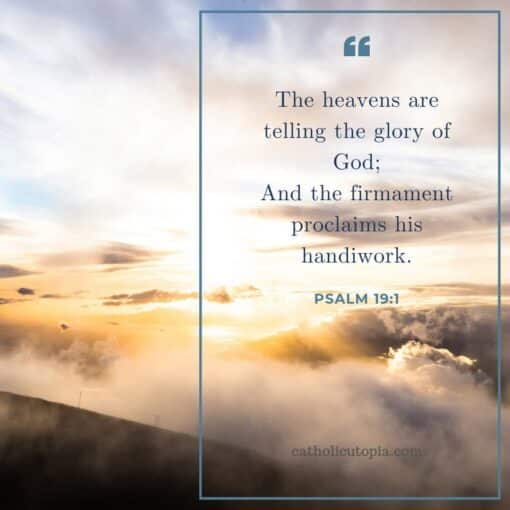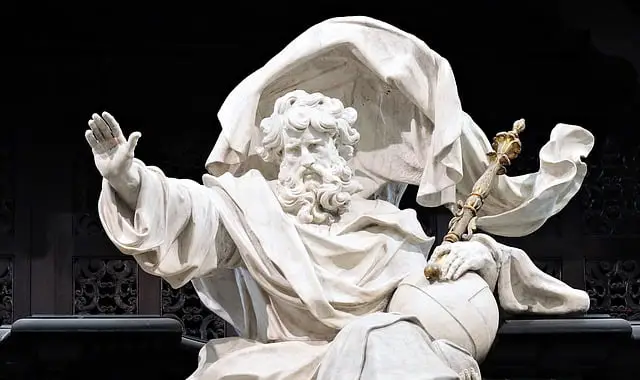Sometimes there can be several doubts on the existence of God. Is He really there? What about those people who say there is no God? And I have nothing to answer!
In every religion, we see people with such devotion and belief towards the Supreme Being? From where does such belief comes from?
I see the whole universe filled with the footprints of God, the Supreme Creator. “The heavens are telling the glory of God and the firmament proclaims his handiwork” (Ps 19:10).
Can Humans Know That God Exists?
Humans can come to limited knowledge of the existence of God by their natural reason. We can find evidence for God’s existence in:
- The existence of the world.
- The order and harmony of the universe.
- The testimony of our conscience.
The Existence Of The World Points To The Existence Of God
- The nature of the world and of everything in it indicates that they all had a beginning. We naturally conclude that they must have been given a beginning by one who had no beginning. We call THIS ONE God (cf ccc 34, 338).
Even if it were possible to conceive a world that has no beginning but exists from eternity – and therefore would contain an infinite series of causes and effects – the ultimate question would still remain:
how to explain that the world exists at all? It is not necessary, it can exist or not exist; it does not have in itself the ground of its existence.
Therefore it must have as its cause a supreme Being so perfect that it exists of itself, and thus exists necessarily.
- When we see footprints in the sand, we conclude that someone has passed that way. Likewise, the universe is filled with the footprints of the Supreme Creator.
This is what St. Paul meant when he told the Roman Christians:
“Ever since the creation of the world his eternal power and divine nature, invisible though they are, have been understood and seen through the things he has made” (Rom 1:20).
- The traditions of all nations and races support the idea of the existence of God. All nations and peoples have an inner conviction of God’s existence; their intellect supports their instinctive trust.
Even among the most primitive people there is invariably found the worship of deity recognized as supreme, on whom humans depend.
There are aboriginal peoples without ruler, laws, or even settlements, but never without some god that they worship with prayer and sacrifice (cf ccc 28).
We find the imprint of the Creator in the very mind of humans, in its deep aspiration to the Infinite. If God does not exist, this aspiration of human nature to the Infinite would tend to nothing, which is absurd (cf ccc 27).
The Order and Harmony of the Universe
The order and harmony of the universe also prove the existence of God because they lead us to infer the existence of a supreme Architect and Preserver of surpassing skill (cf ccc 31-32).
- The heavenly bodies go along their appointed courses age after age. The seasons succeed one another year by year. There is splendour, beauty, arrangement, and order everywhere. The whole universe is governed and preserved by immutable law.

If you plant an orange seed, you are certain an apple will not spring from it. Every morning you are sure the sun when it rises, will appear in the east. At night you can go peacefully to sleep, assured that after your rest the day will come again.
- To say that this universal order is the result of accident, or that the planets direct their own courses, is as foolish as to say that an automobile goes sensibly around the city streets running itself.
“The heavens are telling the glory of God; and the firmament proclaims his handiwork” (Ps 19:1). God is the intelligent Cause (cf ccc 299).
- Long ago Cicero said: “When we contemplate the heavens, we arrive at the conviction that they are all guided by a being of surpassing skill.” The great astronomer Newton often uncovered his head and bowed when God’s name was uttered.
The Testimony of Our Conscience
The testimony of our conscience proves the existence of God because our conscience not only distinguishes right from wrong but also demands absolute (unconditional) submission to the moral law.
This absolute claim of the moral law, manifested by our conscience, implies our dependence on a supreme Lawgiver, who will reward the good that we do and punish the evil.
What Kind of Knowledge of God is this, that we have through Our Reason?
It is a very imperfect knowledge. History has shown and the Church has taught that, unless this purely “natural” knowledge is helped by grace and by revelation, it is often subject to distortion and to error.
Polytheism, the worship of many gods, was widespread among the ancient peoples. It shows how badly one needs God’s special help to know him (cf ccc 35).
The ability to approach God by natural means is important. However, it should not be emphasized to the extent that God’s special revelation of himself loses much of its force.
This “natural” knowledge is little more than a capacity to be open to the infinite mystery of divinity.
It is a wonderful thing that God has given humans this capacity. It is, however, only a faltering step on the road to the full knowledge of God in his Son (cf YOUCAT 4-6).
